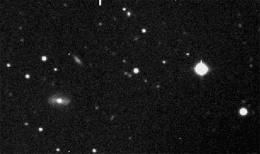45300 Thewrewk
45300 Thewrewk, provisional designation 2000 AF45, is a dark background asteroid from the outer regions of the asteroid belt, approximately 13 kilometers in diameter. It was discovered on 1 January 2000, by astronomers Krisztián Sárneczky and László Kiss at the Piszkéstető Station of the Konkoly Observatory in Hungary.[6] The asteroid was named after Hungarian astronomer Aurél Ponori Thewrewk.[2]
 Thewrewk imaged by Krisztián Sárneczky in January 2000 | |
| Discovery [1] | |
|---|---|
| Discovered by | K. Sárneczky L. Kiss |
| Discovery site | Piszkéstető Stn. |
| Discovery date | 1 January 2000 |
| Designations | |
| (45300) Thewrewk | |
Named after | Aurél Ponori Thewrewk [2] (Hungarian astronomer) |
| 2000 AF45 · 1998 XX37 | |
| main-belt [1] · (outer) background [3] · Eos [4] | |
| Orbital characteristics [1] | |
| Epoch 4 September 2017 (JD 2458000.5) | |
| Uncertainty parameter 0 | |
| Observation arc | 18.48 yr (6,748 days) |
| Aphelion | 3.3504 AU |
| Perihelion | 2.8562 AU |
| 3.1033 AU | |
| Eccentricity | 0.0796 |
| 5.47 yr (1,997 days) | |
| 262.37° | |
| 0° 10m 49.08s / day | |
| Inclination | 10.238° |
| 263.41° | |
| 63.556° | |
| Physical characteristics | |
| Dimensions | 13.230±0.164 km[5] |
| 0.077±0.009[5] | |
| 13.1[1] | |
Orbit and classification
When applying the hierarchical clustering method to this asteroid's proper orbital elements, Thewrewk is both a non-family asteroid from the main belt's background population (according to Nesvorný) and a core member of the Eos family (according to Milani and Knežević).[3][4] It orbits the Sun in the outer asteroid belt at a distance of 2.9–3.4 AU once every 5 years and 6 months (1,997 days; semi-major axis of 3.10 AU). Its orbit has an eccentricity of 0.08 and an inclination of 10° with respect to the ecliptic.[1] The body's observation arc begins in December 1998, with its first observations as 1998 XX37 at Lincoln Laboratory's Experimental Test Site, New Mexico.[6]
Physical characteristics
Diameter and albedo
According to the survey carried out by the NEOWISE mission of NASA's Wide-field Infrared Survey Explorer, Thewrewk measures 13.230 kilometers in diameter and its surface has an albedo of 0.077.[5]
Rotation period
As of 2017, no rotational lightcurve of Thewrewk has been obtained from photometric observations. The body's rotation period, shape and poles remain unknown.[1][7]
Naming
This minor planet was named after Hungarian astronomer Aurél Ponori Thewrewk (1921–2014), who was an expert on the history of astronomy, director of Urania Public Observatory and the Budapest Planetarium, as well honorary president of the Hungarian Astronomical Association (HAA).[2]
The official naming citation was published by the Minor Planet Center on 25 January 2005 (M.P.C. 53471).[8]
References
- "JPL Small-Body Database Browser: 45300 Thewrewk (2000 AF45)" (2017-06-05 last obs.). Jet Propulsion Laboratory. Retrieved 30 November 2017.
- Schmadel, Lutz D. (2006). "(45300) Thewrewk [3.10, 0.09, 10.2]". Dictionary of Minor Planet Names – (45300) Thewrewk, Addendum to Fifth Edition: 2003–2005. Springer Berlin Heidelberg. p. 210. doi:10.1007/978-3-540-34361-5_2485. ISBN 978-3-540-34361-5.
- "Small Bodies Data Ferret". Nesvorny HCM Asteroid Families V3.0. Archived from the original on 2 August 2017. Retrieved 30 November 2017.
- "Asteroid 45300 Thewrewk – Proper Elements". AstDyS-2, Asteroids – Dynamic Site. Retrieved 29 October 2019.
- Masiero, Joseph R.; Mainzer, A. K.; Grav, T.; Bauer, J. M.; Cutri, R. M.; Dailey, J.; et al. (November 2011). "Main Belt Asteroids with WISE/NEOWISE. I. Preliminary Albedos and Diameters". The Astrophysical Journal. 741 (2): 20. arXiv:1109.4096. Bibcode:2011ApJ...741...68M. doi:10.1088/0004-637X/741/2/68. Retrieved 30 November 2017.
- "45300 Thewrewk (2000 AF45)". Minor Planet Center. Retrieved 30 November 2017.
- "LCDB Data for (45300) Thewrewk". Asteroid Lightcurve Database (LCDB). Retrieved 30 November 2017.
- "MPC/MPO/MPS Archive". Minor Planet Center. Retrieved 30 November 2017.
External links
- Asteroid Lightcurve Database (LCDB), query form (info)
- Dictionary of Minor Planet Names, Google books
- Asteroids and comets rotation curves, CdR – Observatoire de Genève, Raoul Behrend
- Discovery Circumstances: Numbered Minor Planets (45001)-(50000) – Minor Planet Center
- 45300 Thewrewk at AstDyS-2, Asteroids—Dynamic Site
- 45300 Thewrewk at the JPL Small-Body Database

